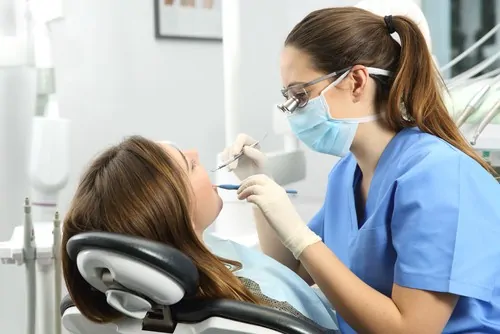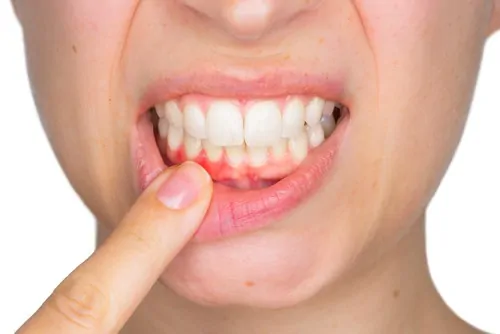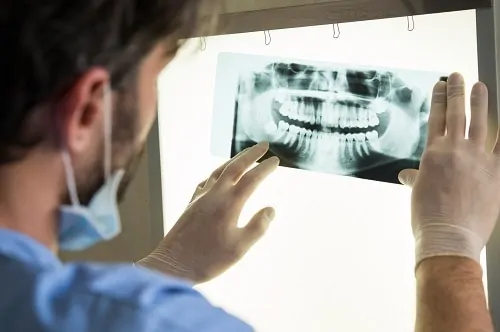Your Douglasville Dentist Says, “Eat Chocolate!”

We’ve got some fantastic news for all of our patients and neighbors with an active sweet tooth! It may come as a surprise, but the team at our Douglasville dental office is telling everyone to go ahead and eat chocolate — for your smile’s sake! But before you head out to buy a dozen of your candy bars, keep in mind that not just any chocolate will do.
Dark Chocolate: The Secret Cavity Fighter
Recent studies conducted by researchers in the United States, England, and Japan show a strong correlation between dark chocolate its ability to ward off decay, cavities, and problem causing plaque. There’s even some evidence to support the idea that dark chocolate may be just as effective, or perhaps more-so, at fighting off cavities as fluoride. However, we’re not suggesting that you pass on your regular fluoride treatments. More research and testing is needed before we can make an absolute claim as to effectiveness of dark chocolate.
Why Dark Chocolate?
It’s not necessarily the dark chocolate itself that has all the oral health benefits. In fact, most credit is being given to compounds found within dark chocolate, or more specifically the cocoa bean husk. All of the beneficial compounds found in dark chocolate are incredibly unique in that they have the ability to fight off both bacteria and plaque. There are even talks of one of these compounds, CBH, becoming an active ingredient in some dental products such as mouthwash and toothpaste because of its benefits.
Why is This Good News?
When we eat anything that contains a lot of sugar, we put our teeth at risk for decay and cavities. As we snack on these sweet treats, sugar gets left behind in the mouth. But it’s not the sugar itself that causes the problem, it’s the bacteria that feed on the sugar. As bacteria fuel up on leftover sugar particles, they also release acid as a byproduct. This acid wears away the protective enamel, leaving teeth exposed to decay. What’s so unique and interesting about dark chocolate is that the bacteria and plaque fighting compounds counteract this process by eliminating bacteria from the beginning.
Remember, Not All Chocolate is Good Chocolate
It’s important to remember that these studies and beneficial oral health claims are limited to dark chocolate and do not include milk chocolate or white chocolate. Even so, not all dark chocolate is created equal either. Try to find dark chocolate with less than 8 grams of sugar per serving. If you can get your hands on organic dark chocolate, that’s even better. Besides having oral health benefits, dark chocolate is also loaded with antioxidants and can be beneficial to overall health too, so don’t shy away from snacking on it.
As always, it’s also important, to maintain a proper oral hygiene routine at home and visit our dental office in Douglasville twice a year for an optimally healthy mouth.
Find Relief From Your Dental Fear

Dental fear is incredibly common among adult Americans. In fact, an estimated 80 million Americans have some level of dental fear. While the team at our dental office in Douglasville certainly understands that being afraid of the dentist is a very real thing, we also always want to try our best to help our patients and neighbors understand how they can overcome that fear and, dare we say, start to enjoy visits to the dentist.
Top Causes of Dental Fear
Dental fear can be brought on by a number of different things, but some of the most common reasons include fear of pain, embarrassment, losing control, or a negative past experience. It’s important for you and your dental team to work together to try to identify the source behind your fear so you can work better together to overcome it.
4 Ways to Ease Dental Fear
Talk About It. Perhaps the most important way to combat dental fear is to establish trust with your dentist in Douglasville. It may help if your dentist talks you through the appointment, letting you know exactly what is going to happen next and what you should expect. Discuss your concerns with your dental team to find what works best for you.
Distract Yourself. We understand that lying down in a dental chair while we poke around in your mouth can cause some people to feel uneasy, and that’s ok. Instead of focusing on what we’re doing, it may help to have a distraction handy. Consider bringing some music and headphones to your next visit or talk with your dental team to see if they have any amenities you can take advantage of.
Just Breathe. Practicing breathing techniques and focusing on breathing patterns has been proven to lower anxiety levels. There are numerous instructional videos online and even some courses you can take to help you. But essentially, close your eyes, take deep breaths, filling the lower part of your belly, and steadily release.
Bring a Friend. If it’s your first dental visit in awhile, have a trusted friend tag along with you. The presence of a trusted person can go a long way in helping you feel relaxed. Make a date out of it and treat them to lunch afterwards.
We Know You Can Do It
Maintaining regular dental cleanings and checkups every six months can be especially hard for those with dental fear. But keeping up with these visits is crucial for good oral health and to avoid more in-depth treatment in the future. Bi-yearly dental appointments help identify and treat any potential problems early and are key to keeping your mouth pain-free and cavity-free.
Whether it’s been awhile since you’ve seen a dentist due to dental fear, or even if you’re just searching for a new dental home, we welcome you to call our Douglasville dental office to schedule an appointment. Our entire team is dedicated to treating each and every patient with the gentle care they deserve and we’d be happy to work with you on easing any fears you may have.
Happy National Dental Hygiene Month!

October is commonly recognized as the month packed with pumpkins, scarecrows, trick-or-treaters, and all things Halloween. At our dental office in Douglasville, October has another important meaning that’s near and dear to our hearts; it’s National Dental Hygiene month – when we recognize our dedicated dental hygienists and bring awareness to the importance of proper oral health.
The Daily 4
Sponsored by the American Dental Hygienists’ Association (ADHA) and the Wrigley Oral Healthcare Program (WOHP), National Dental Hygiene Month has a different focus every year. In 2017, the theme is meant to drive awareness to the main components of a proper oral health routine including:
- Brushing
- Flossing
- Rinsing
- Chewing
The hygiene team that works closely with your dentist in Douglasville is dedicated to educating patients on the importance and proper techniques of these four crucial activities for a healthy mouth. Let’s take a closer look at each one…
Brushing
We’re all taught from an early age to brush our teeth before heading off to school in the morning and prior to hopping into bed at night. This lesson should follow us throughout our entire lives. But it’s not only important to brush every day, it’s crucial that you brush correctly every day. To make sure you’re getting the most out of your routine, always brush twice a day for two minutes each time and use gentle circles with your soft-bristled toothbrush.
Flossing
Brushing is only half of a healthy at home oral hygiene routine. You should absolutely floss in between each tooth every day. If you don’t, you leave about 35% of each tooth’s surface uncleaned and exposed to the dangers of decay.
Rinsing
Besides brushing and flossing, using a mouthwash that’s approved by the American Dental Association (ADA) can enhance your oral health. There are two types of mouthwash — cosmetic and therapeutic. Cosmetic mouthwash may temporarily mask bad breath but has no real oral health benefit, whereas therapeutic mouthwash with the ADA Seal of Acceptance has been tested to ensure it actually does what it claims, which is typically reducing bad breath, gingivitis, decay, and plaque.
Chewing
At our Douglasville dental office, we would love it if every one of our patients would brush their teeth after eating. But we understand that’s not always possible. Instead, we encourage patients to keep sugarless gum handy and chew it after meals. Chewing gum helps produce saliva, which then helps neutralize and rinse away bacteria left over from lunch. Just make sure it doesn’t contain sugar and look again for the ADA Seal of Acceptance.
These Daily 4 activities can go a long way in keeping your smile healthy. But even if you follow them exactly it’s still crucial to maintain your professional dental cleanings and bi-annual checkups. Regular dental visits help remove plaque and tartar and can help catch any potential problems early when treatment is still easy and more effective.
How to Choose a Dentist in Douglasville

Whether you’re new to the area or just looking for a new dentist, choosing the right practice for yourself and your family can be an intimidating process. It’s important to know that not all dentists will be a good fit for your unique needs. But don’t worry, there’s a practice just for you, and we’d like to help you find it.
Do Your Research
The first step to finding the best dentist in Douglasville for your family is to do a bit of research. Ask friends, family, neighbors, or coworkers who they trust with their dental care. Then, compile a list of each and every one. Consider how close to work or home you’ll want the office to be and hop online to look into the office specifics. What services do they offer? What do their reviews say? Narrow down your list to a few that hit your most important criteria and pick up the phone and call them.
Ask Questions
Once you get someone on the phone, use this opportunity to ask questions and get a feel of the personality of the practice. Some questions you should consider include:
-
- What should I expect during my first visit?
- How does the dentist keep up with new technology or training?
- Will my treatment plan and financing options be discussed with me?
Having a conversation with a team member in the office can reveal a lot about the dentist and the practice. The team member should answer pleasantly and be willing to answer any questions you have.
Schedule An Appointment
Once you think you’re ready to make a commitment to one of the dentists you called, it’s a good idea to make an initial appointment and use that visit as a ‘test’ to make sure that you’re comfortable, that you’re treated well, and that the office is clean. At this visit, you should have the opportunity to meet with the dentist so he or she can get to know about your health history, any concerns you may have, and what your oral health goals are. Your first visit should also include a thorough examination of your teeth and gums, an oral cancer check, and any necessary x-rays.
Searching for a new dentist in Douglasville is no easy task. You’re looking for someone who can treat your family the way you want to be treated and who makes you feel comfortable. And even though there are plenty of dental offices to choose from, following the tips above can help make the search easier and ensure you find the right practice for you.
Of course, if you’d like to visit our Douglasville dental office, we always welcome you to give us a call. We’ll be happy to answer any questions you may have to help you to find the best dentist for you.
5 Things Every Dental Patient Should Know

A proper oral hygiene routine at home is just as important as your bi-annual dental appointments.
We typically recommend our patients visit us at least two times a year to have a dental checkup, professional cleaning, and sometimes digital x-rays. These appointments allow us to remove any plaque or tartar that may have built up since your last visit as well as monitor your oral health so we can catch and treat problems early. But these bi-annual visits are only half of what it takes to keep a mouth healthy. The American Dental Association (ADA) and your dentist in Douglasville recommend brushing your teeth twice a day, everyday, with a soft-bristled toothbrush and using gentle circles. It’s also critical to floss once a day to remove food particles and plaque from between teeth.
There’s such a thing as too much brushing.
Scrubbing your teeth may seem like a good idea, afterall, brushing harder must remove more plaque, right? Not necessarily. Brushing your teeth roughly can remove food particles, bacteria, and plaque, but it will also damage gum tissue and eventually cause it to recede. Once gum tissue recedes, the teeth appear longer and sensitivity tends to increase, making it difficult to enjoy some of your favorite cold or hot treats.
Sugary sweets aren’t the only foods that can cause cavities.
A commonly known fact is that a diet full of sugar typically results in more cavities. But a misconception is that sugar is the only cavity culprit. The truth is, many foods can affect oral health and contribute to decay. For example, foods high in carbohydrates like bread, pasta, and pretzels can feed bacteria in the mouth and cause cavities. Carbohydrates break down into simple sugars when eaten. Bacteria then feed on these sugars and eliminate an acidic byproduct. This acid then eats away at the protective tooth enamel, leaving teeth exposed to decay.
Bleeding gums are NOT normal.
Many people think that seeing a bit of blood in your sink as you brush or floss your teeth is normal. The truth is, no amount of blood is normal. Bleeding gums can be one of the first signs of gum disease which is a serious oral health problem that may not only lead to tooth loss, but can also affect the rest of the body. Gum disease has been linked to several systemic problems including diabetes, stroke, and heart disease.
Dry mouth can be a big problem.
We’ve all experienced some form of dry mouth before, whether as a result of being dehydrated or as a chronic issue. Having dry mouth that doesn’t go away could be dangerous for your overall oral health. A dry mouth is a sign that your body isn’t producing enough saliva to keep the mouth moist and rinse away bacteria. Without saliva there to do its job, bacteria is left to linger around, produce acid, and cause cavities.
If it’s time for your bi-annual dental cleaning and exam, call our Douglasville dental office to schedule an appointment.
How to Spot Receding Gums

Receding gums is one of the most common ailments that the patients at our dental office in Douglasville experience. While gum recession is treatable, it can still be painful and sometimes scary to wonder what is going on inside your mouth. In this blog, we’re going to cover how to spot signs of gum recession and some of the reasons as to why this happens in the first place.
Why Do Gum Recede?
Let’s first take a look at why gum recession happens so we can better understand what it is and how to prevent it. While there are numerous causes to gum recession, some even out of our control, the most common reasons tend to be:
- Brushing too hard
- Grinding your teeth
- Tobacco use
- Genetics
- Gum disease
Knowing this, there are steps you can take to reduce your risk of receding gums. First, make sure you’re brushing and flossing everyday. Next, make sure that when you do brush you’re using a soft-bristled toothbrush and a gentle circular motion. Stopping the use of tobacco will not only lower your risk of gum recession but also all kinds of cancer, tooth loss, and stained teeth. While you can’t do much about your genetics, you can do something about catching any dental problems, including gum recession, early.
Recognize the Signs of Gum Recession
The best way to catch gum recession is to make sure you see your dentist in Douglasville at least every six months. Regular visits help get a trained eye on your oral health and it’s the ideal way to identify any dental problems early when treatment tends to be more successful. But dental visits aren’t the only way to help protect your oral health. There are things you can monitor at home in between visits too. Keep a lookout for any of the following and notify your dentist of any concerns:
- Tiny indentations in the teeth close to the gum line
- Teeth that appear longer
- Sensitive teeth
What Happens if Gum Recession Isn’t Treated?
Obviously we’re big fans of getting treatment for gum recession (or any other oral health concern). But why are we in favor of it so much? Because of the wide-spread problems that can happen if treatment doesn’t happen, including:
- Severe inflammation and tooth pain
- Increased susceptibility to bacteria
- Eventual tooth loss
If you suspect that your gums are receding, we’d love to help. Call our Douglasville dental office to schedule an appointment.
What Does Your Smile Say?

A healthy smile is definitely a powerful tool. It can change the mood in a room. It can convey confidence and professionalism, even if you’re not feeling it. You can hear someone smiling over the phone, without even seeing their face light up. My dental office in Douglasville knows the importance of a great first impression because it needs to leave a lasting impression. That’s why we make sure your teeth and gums are healthy so that your smile is one you’ll be proud to share with everyone.
Your Personality is Showing
A smile projects a more positive vibe, friendly and approachable attitude, along with inherent leadership skills. It’s been shown that humans will smile more depending on who is at the other end of the conversation. During our initial contact with other people, our first impressions and assessments are usually made within seconds. Most of the time this is all being subliminally so we’re not even aware we’re doing it.
Your Teeth Tell A Story
Hippocrates believed that every person belongs to one of four different types of temperaments. And believe it or not, your teeth determine what group you belong to. This is known as Morphopsychology-Visagism and it’s the possible connection between your personality and your teeth shape. Your dentist in Douglasville wants to know what category you belong to!
1. Melancholic/Sensitive = Oval-Shaped Teeth
Personality traits include: Artistic, perfectionist, organized, reserved, timid, and abstractive
2. Sanguine/Dynamic = Triangle-Shaped Teeth
Personality traits include: Impulsive, extroverted, communicative, enthusiastic, and eager
3. Choleric/Strong = Rectangular-Shaped Teeth
Personality traits include: Intense, objective, explosive, intense, passionate, and entrepreneurial
4. Phlegmatic/Peaceful = Square-Shaped Teeth
Personality traits include: Conformist, discreet, diplomatic, mystic, and spiritualized
Sharing your smile with the world is important in so many ways. It conveys your intent and personality. Your smile even has the ability to boost another person’s mood, making them more happy in the process. My Douglasville dental office wants to help you put your best smile out there and ensure your true confidence and charisma always shine through.
Accepting new patients from Douglasville, Lithia Springs, Villa Rica and beyond.
I Haven’t Seen The Dentist in Years. Now What?

At my dental office in Douglasville, we generally advise patients to see the dentist regularly, about every six months, to help maintain excellent oral and overall health. However, sometimes things happen in our lives and we just forget to keep up with appointments or schedule a checkup. We see and treat many patients who have not been able to see the dentist for many years because of many different reasons, but we’re always happy to welcome them!
Why Patients Don’t See The Dentist
These are common, valid reasons people tend to avoid the dentist – for a few months to a few years.
- A bad experience at the dentist in the past makes you nervous
- You’re afraid to find out what is wrong or what repairs you may need
- You’re feeling embarrassed because it’s been awhile since your last visit
- You just simply don’t have time to make it to an appointment or cleaning
Let’s Get Your Smile Back on Track
Your dentist in Douglasville is here to help! You don’t have to feel embarrassed or nervous about coming to the office. Thanks to so many advancements in dentistry and a wealth of state-of-the-art technology, going to the dentist is a whole new experience compared to even just a few years ago. If you have an issue that needs to be addressed, we will talk about your options. You’ll never feel pressured to proceed with any treatment you don’t feel comfortable having. We definitely understand how busy your life can be. That’s why we’ve made it easy to schedule an appointment. From the moment you walk in the door, we will make sure you’re comfortable and that you feel at home. We owe it to you and your smile!
What Will Happen At The Office
When you come to see us, we will be there to help you every step of the way. First, we will make sure we have all of the necessary paperwork on file. We can also work with your previous dentist to obtain any past records or x-rays you may have on file there. If you’ve moved or that office is no longer open, it’s no big deal! We will get you set up and comfortable at the office for a thorough exam (including a new set of state-of-the-art x-rays) to get a better understanding of what’s happening with your teeth. Our team will also take a look at your gums too! This way we know if you need extra special care and treatment for gum disease. We will take the time to get to know you and your needs.
My Douglasville dental office is your new home for comprehensive dental care that you can trust. Our team is educated and excited to work with you to get your smile back in the best shape possible, no matter how long it’s been since you’ve sat in the dental chair!
Accepting new patients from Douglasville, Lithia Springs, Villa Rica and beyond.
6 Surprising Foods That Can Damage Teeth

At our dental office in Douglasville, you’ll hear us talk a lot about the importance of regular dental cleanings at least every six months as well as having a healthy at-home oral hygiene routine of brushing twice a day and flossing once a day. But besides keeping your teeth clean, there’s another way you can help ensure your mouth stays healthy… and that’s by avoiding foods that can damage teeth.
The Scary Six
-
- Popcorn. Some of the most common food related dental damage comes from popcorn. Although it’s popped and mostly airy, there’s always the risk of hitting the occasional hidden kernel. Popcorn kernels are really hard and if they’re bitten with force, the chance of having a tooth crack or chip is high. The pesky husks can also cause problems by getting wedged deep in the gums. If they’re not removed, an infection may occur.
-
- Olives. Well, the olives themselves aren’t exactly the problem. It’s more about the pit that’s sometimes left in place. Where the real danger comes into play is when you’re unsure if the pit is still stuck in the middle or not. When this is the case, take your time and explore the olives, checking for any potential tooth-cracking pits.
-
- Caramels. Caramels have two dangerous aspects to them: the sugar and the texture. Ooey gooey caramels tend to linger on teeth for a long time, exposing them to damaging sugar until it’s removed. The super sticky texture can also be difficult to tear or chew which may loosen fillings or other restorations.
-
- Ice Cubes. Although they’re refreshing on a hot summer day, ice cubes are meant to cool a drink, not to be chewed. These frozen cubes have an especially hard texture which can also lead to dental damage like large chips or even tiny cracks you may not even notice at first.
-
- Other Frozen Food. Besides ice cubes, other frozen treats, like frozen candy bars for example, can be especially dangerous. They take the worst of both ice cubes (hard) and caramels (chewy and sweet) and put them into one damaging food.
- Breads. We know you’re thinking that bread is soft, so how can this be on the list? And you’d be right that most bread is soft, but there are some types of bread such as baguettes that are extra crispy and can be hard on teeth while ripping, tearing, or chewing it.
If you do happen to sustain some tooth damage by eating any of these top culprits, or perhaps something we haven’t listed, we welcome you to call our Douglasville dental office as soon as possible. The sooner we’re able to diagnose the damage, the quicker and easier treatment will be. Don’t wait, call today.
All About Dental X-Rays

Dental x-rays are a vital diagnostic tool used to properly identify any underlying conditions that may not yet be visible on the surface. At our dental office in Douglasville, we perform dental x-rays only as often as necessary, which can vary from patient to patient depending on their oral needs and health history. We also understand our patients may have questions regarding dental x-rays, and we’d like to answer them so you can make the best informed decisions about your health.
Intraoral & Extraoral
Dental x-rays, or radiographs, are usually separated into two categories — intraoral and extraoral. Intraoral x-rays mainly focus on the details of the teeth themselves. While extraoral x-rays still showcase the teeth, the aim of these photos is to look at the bigger picture of the teeth within the jaw and skull.
A Closer Look at Intraoral X-Rays
We already know that intraoral x-rays focus on teeth. They’re also the most common types of x-rays and can help:
- Find cavities
- Check bone health around teeth
- Detect gum disease
Bitewing x-rays are the most frequently used intraoral x-rays. They allow your dentist in Douglasville to see cavities in between teeth that aren’t yet visible on the surface. The images produced from bitewing x-rays also help keep an eye on the wear and tear of any dental restorations, such as a filling or an implant.
Explore Extraoral X-Rays
Extraoral x-rays are less detailed than intraoral images, but still serve a helpful purpose when it comes to looking at:
- Impacted teeth
- The jaw and teeth relationship
- Growth and development
The most common extraoral x-rays are panoramic x-rays. These images show the entire set of teeth as well the jaws in one photo. Panoramic x-rays are great when looking at tooth development or wisdom teeth eruption and can help identify problems with the jaw (TMJ).
We recommend visiting our Douglasville dental office at least every six months. We may not perform x-rays at every appointment unless it’s necessary, but visits twice a year are recommended so we’re able to catch problems early, making them easier, and often less costly to treat.



